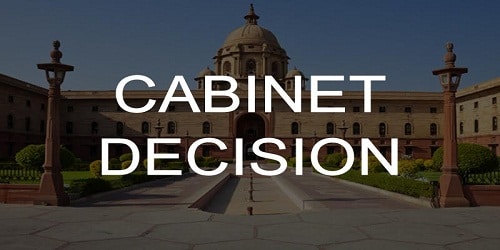The Union Cabinet chaired by the Prime Minister Mr Narendra Modi approved the following proposals on October 9, 2019: Approval for the relaxation of Aadhaar seeding of data of the beneficiaries under PM-Kisan
Approval for the relaxation of Aadhaar seeding of data of the beneficiaries under PM-Kisan
Approval was given for the relaxation of the mandatory requirement of Aadhaar seeded data as a pre-condition for release of funds to the beneficiaries under the Pradhan Mantri Kisan Samman Nidhi (PM-Kisan) scheme till 30th November, 2019.
About PM-Kisan scheme:
The scheme provides income support of Rs 6,000 per year to landholding families, subject to certain exclusions in three 4-monthly installments of Rs 2,000 each directly to the bank accounts of the beneficiaries through Direct Benefit Transfer (DBT) mode. First installment was from December 2018-March 2019, second installment from April-July 2019 and third installment from August- November 2019.
Key Points:
- Aadhaar is not mandatory to receive the third installment of benefits under the scheme.
- Farmers in the states of Assam, Meghalaya and Jammu & Kashmir (J&K), where there has not been enough Aadhaar penetration, have been exempted from this requirement till 31.3.2020.
- This mandatory requirement will remain applicable for release of benefits with effect from 1st December, 2019 onwards.
- Earlier, it was announced that the third installment, would only be credited to those who have linked their Aadhaar with their database.
- Reason: Farmers are gearing up for Rabi season and they are in need of money to take care of various farming activities. Non-seeding of beneficiaries’ details with Aadhaar number will delay the release of further installments and will cause discontentment among the farmers.
- Background: A total amount of more than Rs.27000 crores has already been released under the scheme through the 1st installment to 6,76,76,073 beneficiaries, 2nd installment to 5,14,27,195 beneficiaries and 3rd installment to 1,74,20,230 beneficiaries.
Approval for MoUs signed between India and Foreign Broadcasters in the field of radio and television
Ex-post facto approval was given to the Memorandum of Understandings (MoUs) signed between India and Foreign Broadcasters in the field of radio and television.
i. Benefits: It will help public broadcasters in exploring new visions; New Strategies to address the demands of new technologies and stiff competition; Media liberalization and globalization. It will lead to equity and inclusiveness among viewer/listeners of Doordarshan (DD) and All India Radio (AIR). It will also help in exchanges of technical know-how, expertise and training of manpower.
Approval for apprise of the progress under NHM and decisions of the EPC and MSG of NHM
Approval was given for the apprise of the progress under the National Health Mission (NHM) and its decisions of the Empowered Programme Committee (EPC) and Mission Steering Group (MSG) of the NHM.
Key Points:
- There has been an acceleration in the decline of the Maternal Mortality Ratio (MMR), Under Five Mortality Rate (U5MR) and the Infant Mortality Rate (IMR) since the launch of the National Rural Health Mission (NRHM) /NHM. At the current rate of decline, India should able to reach its Sustainable Development Goal (SDG) target (MMR-70, U5MR-25) much before the due year i.e. 2030.
- India was the biggest success story amongst Malaria endemic countries in the World, reducing Malaria cases and deaths by 49.09% and 50.52% in 2013, respectively, compared to 2017.
- Revised National Tuberculosis Control Programme (RNTCP) has been significantly strengthened and intensified.
- In 2018-19, 52744 Ayushman Bharat Health and Wellness Centres (AB-HWCs) were approved against which 17149 HWCs were operationalized against the target of 15000.
- The untied fund’s amount was increased from Rs, 20,000 to Rs 50,000 for sub health Centres transformed to HWCs.
- Anaemia Mukt Bharat (AMB) Abhiyaan was launched in April 2018 and the Home Based Care for Young Child (HBYC) program was introduced under POSHAN Abhiyaan.
- National Viral Hepatitis Control Programme (NVHCP) was approved for prevention, management and treatment of Hepatitis to A, B, C and E and rollout was initiated which would benefit an estimated 5 crore patients of Hepatitis.
Approval to 5% hike in DA/DR for central government employees and pensioners from 12% to 17%
On the recommendations of the 7th Central Pay Commission (CPC), an approval was given to release an additional installment of Dearness Allowance (DA) to Central Government employees and Dearness Relief (DR) to pensioners with effect from 01.07.2019 representing an increase of 5% over the existing rate of 12% of the Basic pay/Pension to 17%, to compensate for price rise.
- The combined impact on the exchequer on account of both DA and DR would be Rs. 15909.35 crore per annum and Rs. 10606.20 crore in the financial year 2019-20 (for a period of 08 months from July 2019 to February 2020) which will benefit about 49.93 lakh Central Government employees and 65.26 lakh, pensioners.
About DA/DR:
Dear Allowance/Dearness Relief is paid to Central Government employees/pensioners to adjust the cost of living and to protect their basic pay/pension from erosion in the real value. Dear Allowance/Dearness Relief is revised twice a year from 1st January and 1st July.
Approval for the inclusion of 5,300 DP families of Jammu & Kashmir-1947
Approval was given for the inclusion of 5,300 Displaced Persons (DP) families of Jammu & Kashmir (J&K)- 1947 who initially opted to move outside the state of J&K but later on returned and settled in the state of J&K, in the Rehabilitation Package approved by the Cabinet on 30.11.2016 for Displaced Families PoJK and Chhamb under the Prime Minister’s (PM) Development Package 2015 for J&K.
i. Background: In the 1947 Pakistani aggression in J&K, 31,619 families migrated from Pakistan Occupied Areas of J&K (PoJK) to the state of J&K. Of these, 26,319 families settled in the state of J&K and 5300 families initially opted to move out of the state of J&K to other parts of the country. Further during the Indo-Pak wars of 1965 and 1971 10,065 more families were displaced from Chhamb Niabat area. Of these 3,500 families were displaced during the 1965 war and 6565 families were displaced during the 1971 war.
ii. Benefits: They will be eligible to get one-time financial assistance of Rs 5.5 Lakhs under the existing scheme, and in turn, be able to get some sustained income which the existing scheme.
About Union Cabinet:
The Union Council of Ministers exercises executive authority in India. It consists of senior ministers called cabinet ministers, junior ministers called ministers of state and, rarely, deputy ministers. It is led by the Prime Minister.




